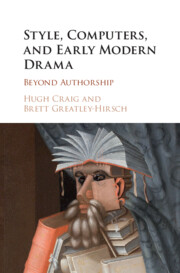Crossref Citations
This Book has been
cited by the following publications. This list is generated based on data provided by Crossref.
Lugea, Jane
2018.
The year’s work in stylistics 2017.
Language and Literature: International Journal of Stylistics,
Vol. 27,
Issue. 4,
p.
329.
Baker, William
2019.
XVIII Bibliography, Textual Criticism, and Reference Works.
The Year's Work in English Studies,
Vol. 98,
Issue. 1,
p.
1309.
Wood, Nigel
2020.
Digitally Post-Human: Living On and After.
CounterText,
Vol. 6,
Issue. 1,
p.
78.
Culpeper, Jonathan
Hardie, Andrew
Demmen, Jane
Hughes, Jennifer
and
Timperley, Matt
2021.
Supporting the corpus-based study of Shakespeare’s language: Enhancing a corpus of the First Folio.
ICAME Journal,
Vol. 45,
Issue. 1,
p.
37.
Zhu, Haoran
Lei, Lei
and
Craig, Hugh
2021.
Prose, Verse and Authorship in Dream of the Red Chamber: A Stylometric Analysis.
Journal of Quantitative Linguistics,
Vol. 28,
Issue. 4,
p.
289.
Clark, Douglas
2022.
The Will and Testament in English Renaissance Drama: Paper Props, Property, and Ulpian Fulwell’s Like Will to Like.
Renaissance Drama,
Vol. 50,
Issue. 1,
p.
103.
Arthur, Jake
2022.
Anne Lock or Thomas Norton? A Response to the Reattribution of the First Sonnet Sequence in English.
Early Modern Women: An Interdisciplinary Journal,
Vol. 16,
Issue. 2,
p.
213.
Brown, Paul
Eisen, Mark
Segarra, Santiago
Ribeiro, Alejandro
and
Egan, Gabriel
2022.
How the Word Adjacency Network (WAN) works.
Digital Scholarship in the Humanities,
Vol. 37,
Issue. 2,
p.
321.
Dooner, Nathan
2023.
Principal component analysis and authorship.
Digital Scholarship in the Humanities,
Vol. 38,
Issue. 4,
p.
1482.
Craig, Hugh
2023.
Principal components analysis in stylometry.
Digital Scholarship in the Humanities,
Colyvas, Kim
Egan, Gabriel
Craig, Hugh
and
Demidenko, Eugene
2023.
Changes in the length of speeches in the plays of William Shakespeare and his contemporaries: A mixed models approach.
PLOS ONE,
Vol. 18,
Issue. 4,
p.
e0282716.
Buckland, Warren
2023.
Who Wrote Citizen Kane?.
p.
29.





